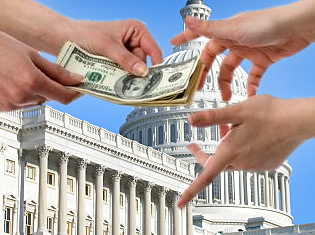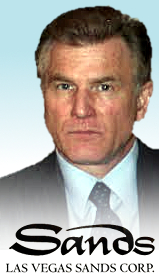 Remember those halcyon days just a few years back, when dreams of passing US federal online gambling legislation earned lobbyists millions of dollars for ultimately doing little more than maintaining the status quo? Well, prepare to go back to the future, as the checkbooks are opening like sleepy flowers greeting the morning sun. A new lobby group backed by MGM Resorts, Caesars Entertainment and the American Gaming Association (AGA) has risen up to challenge Las Vegas Sands chairman Sheldon Adelson’s Coalition to Stop Internet Gambling (CSIG) and its army of factually challenged, tone-deaf social media operatives.
Remember those halcyon days just a few years back, when dreams of passing US federal online gambling legislation earned lobbyists millions of dollars for ultimately doing little more than maintaining the status quo? Well, prepare to go back to the future, as the checkbooks are opening like sleepy flowers greeting the morning sun. A new lobby group backed by MGM Resorts, Caesars Entertainment and the American Gaming Association (AGA) has risen up to challenge Las Vegas Sands chairman Sheldon Adelson’s Coalition to Stop Internet Gambling (CSIG) and its army of factually challenged, tone-deaf social media operatives.
On Tuesday, Politico broke the news of the existence of the Coalition for Consumer and Online Protection (C4COP), which is launching a three-week, $250k online and print ad buy to counter Adelson’s bid to revise the 1961 Wire Act and make online gambling explicitly illegal. Most recently, the CSIG convinced 15 state attorneys general (plus the guy from Guam) to add their names to a letter supporting Adelson’s Wire Act ‘fix’. The majority (13) of these signatories are Republicans, reflecting Adelson’s status as a man who reportedly spent over $100m backing GOP candidates in the 2012 election cycle.
Back in the day, Caesars and MGM routinely ranked among the top lobbyists pushing the federal online poker issue, and they’ve also gone down this tandem lobbying route before, but at least this time they’re being upfront about their involvement. In 2011, the two companies financed FairPlayUSA, an astroturf group that initially bent over backward to paint themselves as a spontaneous ‘grassroots’ movement before copping to their corporate genesis.
Indeed, much of C4COP.com’s raison d’être could have been directly lifted from FairPlayUSA’s talking points, i.e. US casino companies have a monopoly on goodwill, while internationally-licensed online gambling companies are predatory beasts that would eat your children alive if given half a chance. (You really think Ray Bitar got that big just from eating lobster?)
THE COMPETITORS WEIGH IN
The CSIG has retained the services of some ex-pols, including former New York Gov. George Pataki, while C4COP has enlisted two former House Republicans: Ohio’s Mike Oxley and California’s Mary Bono. Oxley chaired the House financial services committee when the UIGEA was passed in 2006, while Bono oversaw a round of online poker hearings in Washington a couple years back.
MGM Resorts public affairs VP Alan Feldman said online gambling supporters had been letting Adelson hog the spotlight too long. “He’s not making a secret of his positions. We shouldn’t be secretive about ours.” Feldman said C4COP had facts on their side, whereas Adelson was “playing on people’s fears.” Bono believes Adelson was wrong to channel King Canute, saying it was “impossible to stand in the way of the internet” and that the best course of action was “to embrace it and try to shape it.”
Last month, new AGA CEO Geoff Freeman made it plain that his group – whose membership includes Sands – “strongly opposes” Adelson’s online gambling stance and would take an active role in “preventing prohibition.” On Wednesday, Freeman told the AGA board that C4COP had broad support, including Indian tribes.
Ironically, C4COP has not received the support of Senate Majority Leader Harry Reid (D-NV), the past champion of federal online poker regulation. The Las Vegas Review-Journal quoted a Reid spokesperson saying her boss didn’t support online gambling other than “games of skill” like poker, but Reid “supports the efforts of states to decide for themselves whether to legalize internet poker.”
The CSIG responded to its rival’s debut with a statement on its website saying C4COP’s backers were “selling a business model that will lead to spiraling debt and job losses for the middle class to deliver profits to giants like MGM and Caesars.” Briefly channeling Simon & Garfunkel and/or Frederick Browning, the CSIG said online gambling was “a bridge too far that Americans cannot abide.”
 SANDS’ GOLDSTEIN SAYS CAESARS ET AL WILL REGRET GOING ONLINE
SANDS’ GOLDSTEIN SAYS CAESARS ET AL WILL REGRET GOING ONLINE
Much of the discussion regarding Adelson’s anti-online stance has centered on his motives. Adelson has stated that his objections are primarily based in morality, but he’s also stated his (misguided) belief that brick-and-mortar casino revenue will suffer cannibalization. The popular view of Adelson’s objections is that of an 80-year-old yelling ‘get off my lawn’ and suspicions have been voiced that few in the Sands organization share Adelson’s view.
In December, Rob Goldstein (pictured), Sands’ president of global gaming operations, told Global Gaming Business’ Roger Gros that Adelson’s views shouldn’t be dismissed, recalling that Adelson’s early predictions of success in Macau and Singapore weren’t universally shared within the industry at the time. Goldstein, an 18-year Sands veteran, shares Adelson’s pejorative view on online gambling but Goldstein’s concerns are rooted more in his sense that online gambling offers “limited value” for operators.
Goldstein says online gambling’s “cost of entry is incredibly small” for operators, but once you’re in it, “reinvestment becomes larger and larger.” Goldstein believes the online game is “all about marketing dollars” because “customers have no loyalty.” Goldstein says margins erode quickly when “the deal becomes the driver,” comparing it to neighborhood gas stations undercutting each other’s price per gallon in order to woo customers.
Goldstein thinks there are “too many folks chasing the same dollars” online and there’s a finite number of dollars out there. Goldstein claimed to be “shocked that some of these regional operators don’t see the risk in this thing.” Goldstein’s opinion is that the eventual impact of online gambling will be “very negative” and that once it goes “full-bore,” the MGMs, Caesars and Boyd Gaming’s of the world “will regret having supported it.”
